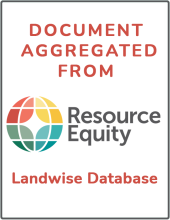Land Library
Bienvenue dans la bibliothèque du Land Portal. Explorez notre vaste collection de ressources en libre accès (plus de 74 000), comprenant des rapports, des articles scientifiques, des articles de recherche, des publications évaluées par des pairs, des documents juridiques, des vidéos et bien plus encore.
/ library resources
Showing items 1 through 9 of 83.The authors address questions such as: (1) how do parents allocate land and education between sons and daughters? (2) how do changing returns to land and human capital affect parents' investments in children?
"While ample evidence documents that urban children generally have better nutritional status than their rural counterparts, recent research suggests that urban malnutrition is on the rise.
Agricultural growth will prove essential for improving the welfare of the vast majority of Africa’s poor. Roughly 80 percent of the continent’s poor live in rural areas, and even those who do not will depend heavily on increasing agricultural productivity to lift them out of poverty.
"This study attempts to analyze changing patterns of land transfers and schooling investments by gender over three generations in customary land areas of Ghana's Western Region.
This brief considers the benefits and costs of alternative tenure and institutional arrangements and the impact of existing legal and policy frameworks on the sustainability and equity of pastoral production systems under three categories of landownership: (1) state ownership; (2) individual owne
This paper analyzes the impact of land titling on child health and education in Argentina.
Governments are now shifting their role from direct management of irrigation systems to regulation of the water sector, provision of support services to water user associations, and capacity building among water user associations and irrigation service providers....
With urban dwellers purchasing 80 percent or more of their food, understanding urban employment is critical to designing policies and programs to address urban hunger and poverty.


